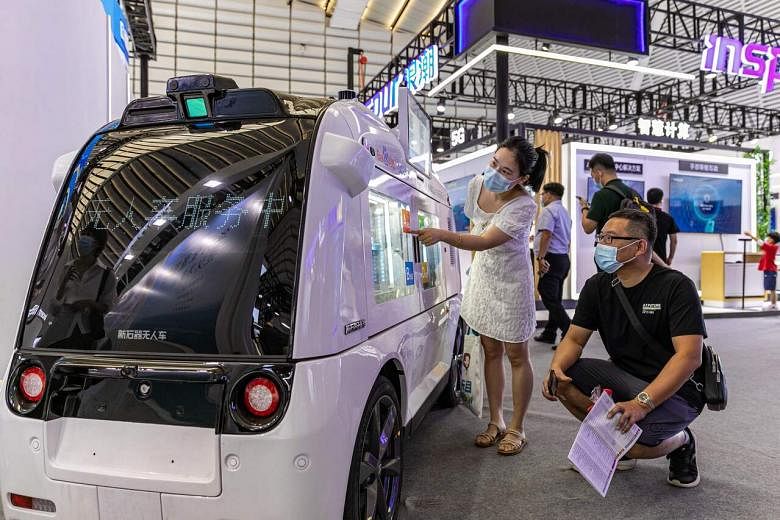SINGAPORE - Things are finally looking up for the meetings, incentives, conventions and exhibitions (Mice) sector in Asia, which has been in the doldrums for nearly two years due to the Covid-19 pandemic.
Industry players are hoping that easing border restrictions and increasing vaccination rates will help revive the badly battered sector.
Most events being organised for now are home-grown affairs, but the industry hopes that as more countries transition to treating Covid-19 as endemic, international delegates will return, possibly as soon as next year.
"We finally see a light in this dark tunnel," Asian Federation of Exhibition and Convention Associations president Vincent Lim told The Straits Times. "It is heartening to see the Asian Mice industry slowly getting back on its feet."
Prior to the pandemic, the Mice industry in the Asia-Pacific generated close to US$230 billion (S$310 billion) in revenue in 2017, and this was expected to nearly double to more than US$440 billion by 2025, according to market research company Allied Market Research.
Then Covid-19 hit in 2020 and many operators have either been forced to close down or find other ways to hang on.
Malaysian Richard Soo, 53, told ST that his events management and marketing promotions agency's business went from "very good" to "zero" right after Chinese New Year in 2020.
Like many of its peers, his company pivoted online by running webinars and virtual events, but this was not enough to sustain the business. He had to let go of some staff and instituted pay cuts just to keep the firm afloat.
Mr Francis Teo, president of the Malaysian Association of Convention and Exhibition Organisers and Suppliers, estimated that the country's Mice business lost RM4.5 billion (S$1.5 billion) since the pandemic and over 1,500 events were either cancelled or postponed.
But lately, interest in small-scale corporate events, such as training programmes and product launches by local companies, has picked up, according to Mr Teo.
He attributed this to the fact that most Malaysian states have eased restrictions and are allowing in-person events with strict protocols such as physical distancing and mandatory disinfection and sanitising of event locations. "We believe the outlook is better now... the industry will rebound in this new normal," Mr Teo said.
The Kuala Lumpur Convention Centre has locked in over 50 events in the next couple of months.
"We are also seeing an increase in event inquiries for meetings and banqueting events for the year-end period and next year," said its general manager Alan Pryor.
Malaysia will be hosting 15 international conferences next year with 16,000 international visitors expected, contributing RM140 million to the economy. Tourism, Arts and Culture Minister Nancy Shukri said on Oct 23 that Malaysia needed to capitalise on the Mice sector to boost economic recovery.
Neighbouring Indonesia has also started to ease restrictions, with its capital Jakarta allowing medium- scale events to be held at up to 50 per cent capacity, subject to social distancing requirements and prevailing health protocols.
This has sparked hope that brighter days are coming for the sector, said Mr Hosea Andreas Runkat, chairman of the Indonesian Exhibition Companies Association, who noted that it suffered losses of 44 trillion rupiah (S$4.2 billion) in 2020.
Fears of an impending third Covid-19 wave have not dampened spirits, said Mr Runkat, who is also a director of the Jakarta Convention Centre.
"It won't be as serious as before because more people are already vaccinated and are getting their booster jabs. I don't foresee any more tight lockdowns like last year," he told ST.
Similarly, in Thailand, the sector has welcomed the government's decision to scrap quarantine for fully vaccinated air travellers from at least 10 low-risk countries from Nov 1.
The Thailand Incentive and Convention Association (Tica) described the move as "a blessing".
"We believe the plan is practical to proceed with caution... (the) Phuket sandbox is an effective confidence booster and is an excellent lead-in for countrywide reopening," Tica president Sumate Sudasna told ST in an e-mail.
In China, exhibitions have restarted, but they are mostly tailored to local residents or employ a hybrid online-offline format. According to data from the Ministry of Commerce, China held 1,210 exhibitions in the first five months of this year, an increase of 330 per cent year on year.
Chinese travel giant Trip.com recorded 390 million yuan (S$82.3 million) from corporate travel revenue in the second quarter of 2021, representing a 141 per cent increase from the same period in 2020, and a 55 per cent rise from the previous quarter, primarily due to the recovery of China's domestic market.
"Trip.com Group data shows demand for Mice and business travel remains positive even with Covid-19 restrictions," a spokesman said in response to questions from ST.
The current flare-up of Covid-19 cases in China is a cause for concern, but in-person events that attract thousands of visitors are still being held at the Shanghai New International Expo Centre (SNIEC), said its general manager Michael Kruppe.
Hong Kong resumed organising physical shows in April while implementing stepped-up on-site hygiene measures. The city rolled out nearly 20 physical exhibitions at the Hong Kong Convention and Exhibition Centre from April to June.
Even after the pandemic subsides, many expect the physical-virtual hybrid model to be the new norm.
"Though not that profitable, virtual events helped Mice stakeholders maintain presence in the industry and keep close contact with clients/visitors/industry and their international network," Ms Marisa Nallana, vice-president of Philippine Association of Convention and Exhibition Organisers and Suppliers, told ST.
As such, it is important that enterprises accelerate their digital transformation, where industry partners and players are encouraged to explore different possibilities while embracing technology and digital solutions.
"We are entering a brand-new era, where it has become the era of not just the existence of face-to-face meetings. We need to change our mindset and embrace change, while at the same time continue being creative in enhancing support and service offerings," International Congress and Convention Association's Asia Pacific Chapter chairman Ashwin Gunasekeran told ST.
But some feel virtual or hybrid events could never replace face-to-face interactions, where spontaneity could spark an idea or seal a business deal.
"I am for face-to-face meetings because we believe in the human touch. We tried some online and hybrid events, but they cannot attract anyone in the long term and require high digital investments," SNIEC's Mr Kruppe told ST.
Generally, the hope is for more easing of travel restrictions.
Although Indonesia currently allows foreigners from 19 countries to enter Bali and the Riau islands, Mr Runkat said this does not help the industry due to the five-day quarantine requirement.
"I have suggested to the government to establish a quarantine-free travel corridor, subject to strict protocols. Alternatively, decrease the quarantine days, and then maybe people will come in," he said.
Ultimately though, it is holding events in a safe way that will pave the way for confidence to return.
Ms Nallana has suggested that the private sector conduct trials on the physical reopening of Mice events, with support from the government.
"This will be a showcase to show that proper safety and health protocols are in place to rebuild confidence to visit Mice events and to communicate that such events are safe," she said.
Covid-19 measures for events in Asia
Malaysia
Only states under phase three and four of the country's four-phase recovery plan are allowed to hold Mice events. Under phase three, events can be held at 50 per cent of the venue's capacity, while the capacity depends on the venue's size under phase four, with safe distancing measures in place.
Under both phases, a minimum distance of 1m must be maintained, while for seating arrangements, there must be a minimum distance of 2m. Only fully vaccinated individuals are allowed to attend Mice events. The unvaccinated must undergo pre-event rapid antigen testing. Attendees must also observe rules on mask wearing.
Japan
Since Oct 1, Japan has lifted its state of emergency after a drop in the number of Covid-19 cases.
Events are not subjected to capacity curbs, though organisers have imposed ground rules such as mandating mask wearing for entry, having temperature checks at the door, as well as providing hand sanitisers at every booth.
China
Attendees have to show proof of vaccination and do a polymerase chain reaction test before arrival at any Mice event. Other measures include mask wearing, temperature checks and health code checks.
Hong Kong
Besides mask wearing and keeping to a 1.5m rule for social distancing, all event organisers, staff or anyone providing services for the event have to undergo a China-based nucleic acid test for Covid-19 within 14 days of the event. Alternatively, the individual needs to prove he or she is fully vaccinated.
The maximum capacity allowed is 100 per cent if all event organisers and staff, as well as at least two-thirds of the participants, have had a first vaccine dose.
Indonesia
In Jakarta, Mice events are capped at 50 per cent of a venue's capacity. Seats have to be spread out with a distance of at least 1.5m between attendees, with no intermingling.
There are also rules for meals. Buffets are not allowed, and food has to be served in bento boxes.
All attendees and staff must use the Peduli Lindungi tracing app.
Philippines
Since Oct 15, indoor seating capacity for Mice venues has been set at between 10 per cent and 100 per cent depending on the province's alert level. All Mice employees are required to be fully vaccinated.
For Metro Manila, where major convention and exhibition centres are located, seating capacity at venues is set at 60 per cent for indoor events, and 80 per cent for outdoor events, depending on the vaccination rate of the city and provided attendees have government-issued safety seal certification.
Recent and upcoming events in Asia
Malaysia
ASIAN BATTERY CONFERENCE AND EXHIBITION (Nov 3 to 5)
- Virtual conference with more than 300 attendees
Indonesia
INDONESIA SHARIA ECONOMIC FESTIVAL 2021 (Oct 25 to 30)
- Discussion on the latest developments in Islamic economics and finance
Hong Kong
2021 HONG KONG FINTECH WEEK (Nov 1 to 5)
- A hybrid event with 17,000 attendees expected
Japan
TOKYO'S DECARBONISATION EXPO (Sept 29 to Oct 1)
- About 25,500 in-person visitors
China
CHINA INTERNATIONAL AVIATION & AEROSPACE EXHIBITION (Sept 28 to Oct 3)
- About 700 companies from nearly 40 countries and regions took part in the Airshow China exhibition, a showcase of aviation, aerospace and national defence, in Zhuhai, Guangdong
CHINA INTERNATIONAL IMPORT EXPO (Nov 5 to 10)
- Enterprises across the world will showcase their products in Shanghai


